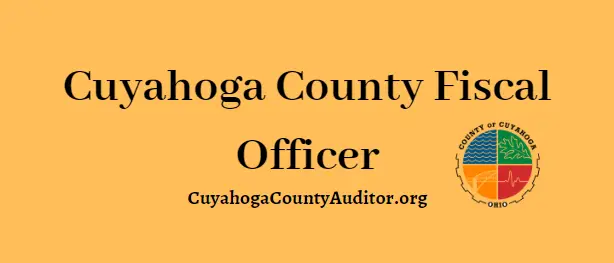In the administrative structure of Cuyahoga County, Ohio, the Fiscal Officer is a key figure responsible for managing the county’s finances. This role involves various duties aimed at safeguarding public funds, maintaining financial records, and facilitating economic stability within the region.
Responsibilities of the Fiscal Officer
Managing Property Taxes
One of the primary responsibilities of the Cuyahoga County Fiscal Officer is the administration of property taxes. This entails assessing property values, calculating tax obligations, and collecting payments from property owners.
Overseeing County Budget
The fiscal officer plays a vital role in the formulation and execution of the county budget. This involves collaborating with other government officials and departments to allocate resources effectively, prioritize expenditures, and ensure fiscal sustainability.
Financial Reporting
Ensuring transparency and accountability, the fiscal officer is tasked with preparing and presenting financial reports to relevant stakeholders. These reports provide insights into the county’s financial health, expenditure patterns, and revenue streams.
Importance of the Position
The role of the Cuyahoga County Fiscal Officer holds significant importance in the overall governance and economic development of the region. By maintaining fiscal discipline and sound financial management practices, the fiscal officer contributes to the county’s stability and growth.
Qualifications and Selection Process
To serve as the Fiscal Officer, individuals are required to possess a combination of educational qualifications and relevant experience in finance, accounting, or public administration. The selection process typically involves appointment or election, depending on the jurisdiction’s regulations.
Educational Background
Candidates for the position often hold degrees in finance, accounting, economics, or a related field. Advanced degrees or professional certifications may also be preferred.
Experience Required
Prior experience in financial management, budgeting, or government administration is highly valued. Candidates with a proven track record of fiscal responsibility and leadership are often favored.
Selection Process
The process for selecting the Cuyahoga County Fiscal Officer may vary, ranging from appointment by elected officials to direct election by the county’s residents. Regardless of the method, candidates are typically subject to scrutiny and evaluation based on their qualifications and suitability for the role.
Challenges Faced by the Fiscal Officer
Economic Changes
The fiscal officer must navigate through economic fluctuations and uncertainties, adapting financial strategies to mitigate risks and maintain stability during challenging times.
Budget Constraints
Limited resources and competing demands necessitate careful budget planning and allocation to address essential services while maximizing the impact of public spending.
Legislative Changes
Changes in legislation and regulatory frameworks can impact fiscal policies and procedures, requiring the fiscal officer to stay abreast of legal developments and adjust financial practices accordingly.
Impact on County Residents
The decisions and actions of the fiscal officer directly affect county residents, influencing taxation, public services, infrastructure development, and overall quality of life within the community.
Initiatives and Programs
The fiscal officer may spearhead various initiatives and programs aimed at promoting financial literacy, taxpayer assistance, economic development, and community empowerment.
Technology and Innovation in Fiscal Management
Embracing technological advancements and innovative solutions can enhance efficiency, transparency, and accountability in fiscal operations and financial reporting.
Collaboration with Other Departments
Collaboration with other county departments and stakeholders is essential for holistic decision-making, resource optimization, and achieving shared goals for community development.
Fiscal Officer’s Role in Economic Development
The fiscal officer plays a crucial role in fostering economic growth and prosperity by supporting business initiatives, infrastructure projects, and strategic investments that stimulate job creation and entrepreneurship.
Transparency and Accountability
Maintaining transparency in financial matters and upholding high standards of accountability instills public trust and confidence in the fiscal management of county resources.
Community Engagement
Engaging with residents, businesses, and community organizations fosters dialogue, solicits feedback, and promotes inclusive decision-making processes that reflect the diverse needs and interests of the county’s population.
Success Stories
Highlighting success stories and positive outcomes resulting from effective fiscal management reinforces the importance of prudent financial practices and encourages continued support for public initiatives.
Future Outlook
Looking ahead, the role of the Cuyahoga County Fiscal Officer remains pivotal in navigating evolving economic dynamics, embracing innovation, and fostering sustainable growth for the benefit of current and future generations.
Conclusion
In conclusion, the Cuyahoga County Fiscal Officer serves as a steward of public funds, entrusted with the responsibility of promoting fiscal integrity, accountability, and economic prosperity within the community. Through strategic leadership, collaboration, and a commitment to transparency, the fiscal officer plays a vital role in shaping the county’s financial landscape and ensuring a brighter future for its residents.
